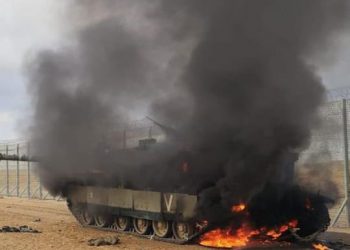An incident occurred at the Joint Security Area (JSA) in the demilitarized zone separating South and North Korea, where a US soldier on a JSA orientation tour crossed the Military Demarcation Line into North Korea without authorization. South Korean newspaper The Dong-a Ilbo reported that the soldier’s name is Travis King, although his identity has not been officially confirmed.
The United Nations Command has confirmed the incident and stated on Twitter that they believe the soldier is currently in North Korean custody. They are working with their North Korean counterparts to resolve the situation.
The JSA is a significant area where South and North Korean forces face each other and is often used for diplomatic meetings and as a tourist spot.
A spokesperson for the US military in South Korea stated that they are still gathering information and conducting research about the incident.
It is important to note that the US bans its citizens from entering North Korea, and in the past, Americans who have entered the country have faced accusations of spying. Delicate diplomacy has been required to secure their release.
This incident occurs amid heightened tensions between the US and North Korea due to North Korea’s missile tests and allegations of airspace violations by US spy planes.
The soldier’s identity has been reported as Private 2nd Class Travis King, according to officials who spoke to CBS News. It is said that the soldier was being escorted out of the country for disciplinary reasons but managed to return and join a tour at the border. The motivation for crossing into North Korea remains unclear.
The soldier crossed during an orientation tour of the Joint Security Area (JSA), which is the only location along the border where troops from the two Koreas face each other. The area is historically significant, as it is where the Korean Armistice Agreement of 1953 was signed.
The Demilitarized Zone (DMZ) between North and South Korea is known as one of the most dangerous places in the world, with heavily guarded borders and landmines. Defections across the DMZ are rare, although dozens of people attempt to flee North Korea every year.

